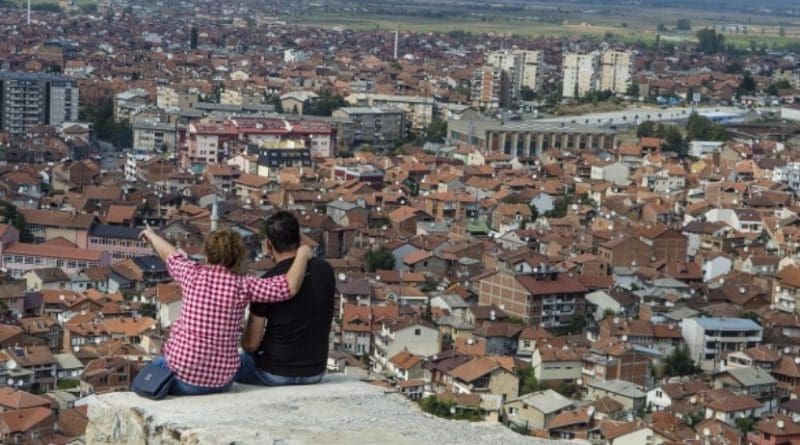In Kosovo, Bitter Rivals Turn Electoral Allies – Analysis
Policy differences are no obstacle to electoral pacts between parties in Kosovo, where parliament is about to fire the starting gun for yet another early election.
By Perparim Isufi
Lawmakers in Kosovo are expected to vote to dissolve parliament on Thursday, starting the countdown to a parliamentary election within 45 days.
But even before the clock starts ticking, political parties are busy seeking running mates to improve their electoral prospects, often, analysts say, ignoring official ideological differences.
Outgoing Prime Minister Ramush Haradinaj, questioned as a suspect by war crimes prosecutors in The Hague in July, struck an electoral pact on Monday between his centre-right Alliance for the Future of Kosovo, AAK, and the centre-left Social Democrat Party, PSD, of Pristina mayor Shpend Ahmeti.
The Democratic League of Kosovo, LDK, is also in talks to form an even more unlikely opposition alliance with the Vetevendosje [Self-Determination] party of Albin Kurti.
Kosovo’s electoral system favours alliances. Yet the co-ruling Democratic Party of Kosovo, PDK, part of four successive governments since Kosovo’s 2008 secession from Serbia, looks like being left out in the cold, raising doubts about its chances of retaining power.
A Haradinaj-Ahmeti tie-up has been in the offing since 12 PSD lawmakers, deserters from Vetevendosje in May 2018, backed the government’s budget and a number of other government bills early this year.
Their parties, however, make for strange bedfellows.
“We see that coalitions so far have been established on the basis of electoral calculations rather than on the principles of program affiliation,” said Prishtina political sciences lecturer Bekim Baliqi.
“The coalition between AAK and PSD is the most exemplary case of an unnatural coalition,” he told BIRN.
“Unfortunately, without democratisation and proper profiling, we cannot expect coalitions to be made based on ideological orientations,” Baliqi added. “Left and Right wings in political parties in Kosovo are only self-inscriptions that do not say much when it comes to their programme content.”
From bitter rivals to election allies
Whatever the wisdom of their pact, the AAK-PSD deal will pile pressure on other big political parties to tie down their coalitions, said sociologist and political analyst Artan Muhaxhiri.
Kosovo’s constitution bestows the right to form the government on the political entity, i.e. party or bloc, with the most votes in an election. Twenty of parliament’s 120 seats are reserved for ethnic minorities.
“The biggest damage in the process of establishing new Kosovo governments comes with the extreme improvisations that happen at the last minute, when parties suspend almost all criteria of normality and make concessions that later cause functional problems,” Muhaxhiri told BIRN.
Time is running out for an LDK-Vetevendosje deal.
Long part of the political establishment in Kosovo, the LDK and its late leader Ibrahim Rugova were behind a decade of passive resistance by Kosovo Albanians to Serbian rule before they were eclipsed by a guerrilla insurgency led by the likes of Haradinaj and PDK leader Kadri Veseli in the late 1990s.
Vetevendosje began as a street movement in the years running up to Kosovo’s declaration of independence, clashing with police and, since entering parliament, on several occasions releasing tear gas in the chamber as a form of protest.
Kurti, a political prisoner in Serbia in the 1990s, and LDK leader Isa Mustafa sat down for talks last week but reports say both parties insist on filling the post of prime minister.
“We will not wait forever,” Vetevendosje deputy leader Glauk Konjufca told Prishtina-based broadcaster T7 on Monday.
“We will wait for LDK until the end of August,” he said. “People have their hopes vested in Vetevendosje and we cannot enter an electoral campaign without having the candidate for prime minister.”
Muhaxhiri said recent opinion polls showed only narrow differences in support between Vetevendosje, LDK, PDK and AAK.
“Merges would create an important effect on the election result,” he said.
“So far, coalitions have been made between parties which until the moment of the agreement have been fierce opponents,” Muhaxhiri told BIRN. “The irony lies in the continuation of this practice.”
PDK exhausted and unwanted
One party with no obvious partner is the PDK, which emerged from the ranks of the guerrilla Kosovo Liberation Army and was for years led by current Kosovo President Hashim Thaci.
The other big parties have ruled out allying with the PDK after it was part of four successive governments since 2008, each failing to see out its full four-year mandate and each dogged by allegations of corruption and economic mismanagement.
“Let them keep their red lines,” PDK lawmaker Xhavit Haliti said on Tuesday of the other parties and their refusal to join forces with the PDK.
Some analysts say the party is politically exhausted.
“PDK has closed a long cycle in government which has been identified with corruption affairs and many institutional abuses,” Muhaxhiri said.
“Lack of a deep transformation which would include comprehensive changes of party leadership and political mentality mean PDK is no longer considered a trustworthy partner in government.”
Baliqi agreed, telling BIRN: “It would be wise for the PDK itself to not insist on any coalition because co-governance during recent years has exhausted it as a political party and any continuation would completely destroy it.”
“But we cannot exclude any coalition after the elections. It depends on the election results and the interests of the international community.”

